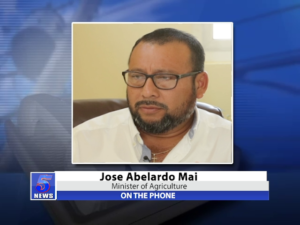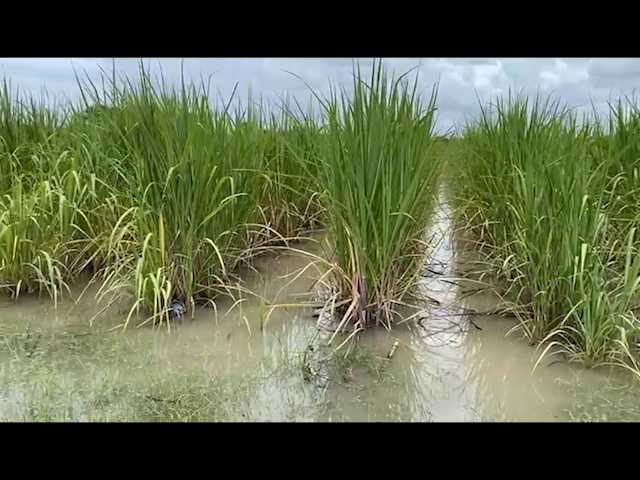B.S.I. Halts Cane Processing because of Beryl
Hurricane Beryl is still over a thousand miles away from Belize, but already it is affecting business in the country. On Monday, the Belize Sugar Industries Limited stopped receiving burnt cane to prepare for the passage of the hurricane. The crop would have come to an end in the next few weeks; however, the premature closure will result in losses to cane farmers in the northern districts. B.S.I., in a press release, explained that it needed to shut down operations because it needed sufficient time to render the mill and cogeneration plants safe before the hurricane. After that two-day process, the factory must then finalize its hurricane preparations to allow employees twenty-four hours to also carry out their personal hurricane preparations. Today, News Five’s Marion Ali spoke with Alfredo Ortega, the Belize Sugar Cane Farmers Association Vice Chairman of the Committee of Management, about the losses caused by the recent floods and the early closure caused by Beryl. We also got a word with Minister of Agriculture, Jose Abelardo Mai about the two situations. Here’s that report.
Marion Ali, Reporting
What began as a significant loss to canefarmers in the north, can be made worse should Hurricane Beryl cause flooding in the sugar belt which is already inundated by recent floods. Alfredo Ortega, the Vice Chairman of the Belize Sugar Cane Farmers Association’s Committee of Management, tells News Five that the recent rains came at the most inopportune time for the caneros, just when Tower Hill was processing more than regular amounts.

Alfredo Ortega
Alfredo Ortega, Vice Chairman, Committee of Management, B.S.C.F.A.
“When they started to increase their milling, it’s when the rain fell and it was so hard for the farmers to bring all that cane. And what happened also is that it increased. The amount for the farmers to bring all that in from the field because they had to use other tractors and some of them had to bring it out with the loaders and it really increased the cost for the group leaders to bring all that cane from the field and with the abrupt stuff that happened the farmers had to lift that amount of cane in the fields at which amount.”
The Minister of Agriculture anticipates that Hurricane Beryl will not cause severe flooding to exacerbate the existing problem. The wait and see, however, is causing precious time to slip by.

Voice of: Jose Abelardo Mai
Voice of: Jose Abelardo Mai, Minister of Agriculture
“I am not sure if we will have time to reopen the mill again, to be honest. From what I understand, a lot of product was lost in the flooding, and also we had to stop production, so what already had been burnt is going to be lost as people go home and prepare for the upcoming hurricane.”
Britney Gordon
“Is there any sort of figure you can give me in regards to the loss of cane?”
 Voice of: Jose Abelardo Mai
Voice of: Jose Abelardo Mai
“No, because yesterday when the mill closed, it was at midday. I was called by a few people – farmers expressed that they still had cane in the fields being harvested, so I asked them to try to get the cane out before the mill closes but they were struggling to get it out in the wet cane fields.”
Ortega says that the current losses caused by the floods are estimated at around two thousand tons of burnt cane alone. This is separate from cane that is still in the ground. Those losses won’t be determined until after the crop closes in a few weeks.
 Alfredo Ortega
Alfredo Ortega
“What the personnel from B.S.I. was speaking [about] is that they believe that they can go if the weather permits to mid July or a little bit more if the weather permits. So we don’t know exactly what for a date right now to finish, but what they said is in the mid of this month that just started. But as we speak, that we have the threat of the hurricane, maybe not a direct landfall, but we will be having an amount of rain due to that. And we don’t know what will be the extent of the damage or the flooding that we’ll be having with them, so we don’t know if this is the end of the crop or we will be having some more days after the hurricane. So we cross our fingers.”
 B.S.I. is working with canefarmers to improve the climate resilience of their crops by supporting the replanting of cane varieties. This would decrease the industry’s dependency on one variety alone. Ortega explains that this is a program the factory is offering them. He says that it is something that some farmers accept and some still have reservations about.
B.S.I. is working with canefarmers to improve the climate resilience of their crops by supporting the replanting of cane varieties. This would decrease the industry’s dependency on one variety alone. Ortega explains that this is a program the factory is offering them. He says that it is something that some farmers accept and some still have reservations about.
Alfredo Ortega
“They called it in Agro-Pro, I believe on which they are giving services to farmers on planting or replanting their fields again, on which they are proposing different varieties that they have. Nevertheless, there are some farmers that are somewhat sceptical to the new varieties because they have had a bad experience before with new varieties being planted on their field. It’s accepted by some because they really want to have new plantings on or better yields on their field, but there is an amount of farmers that are really sceptical on getting that service for them because at the same time, the service is a little bit high, and it’s like a, loan that you get for that service to happen.”
Marion Ali for News Five.







Facebook Comments